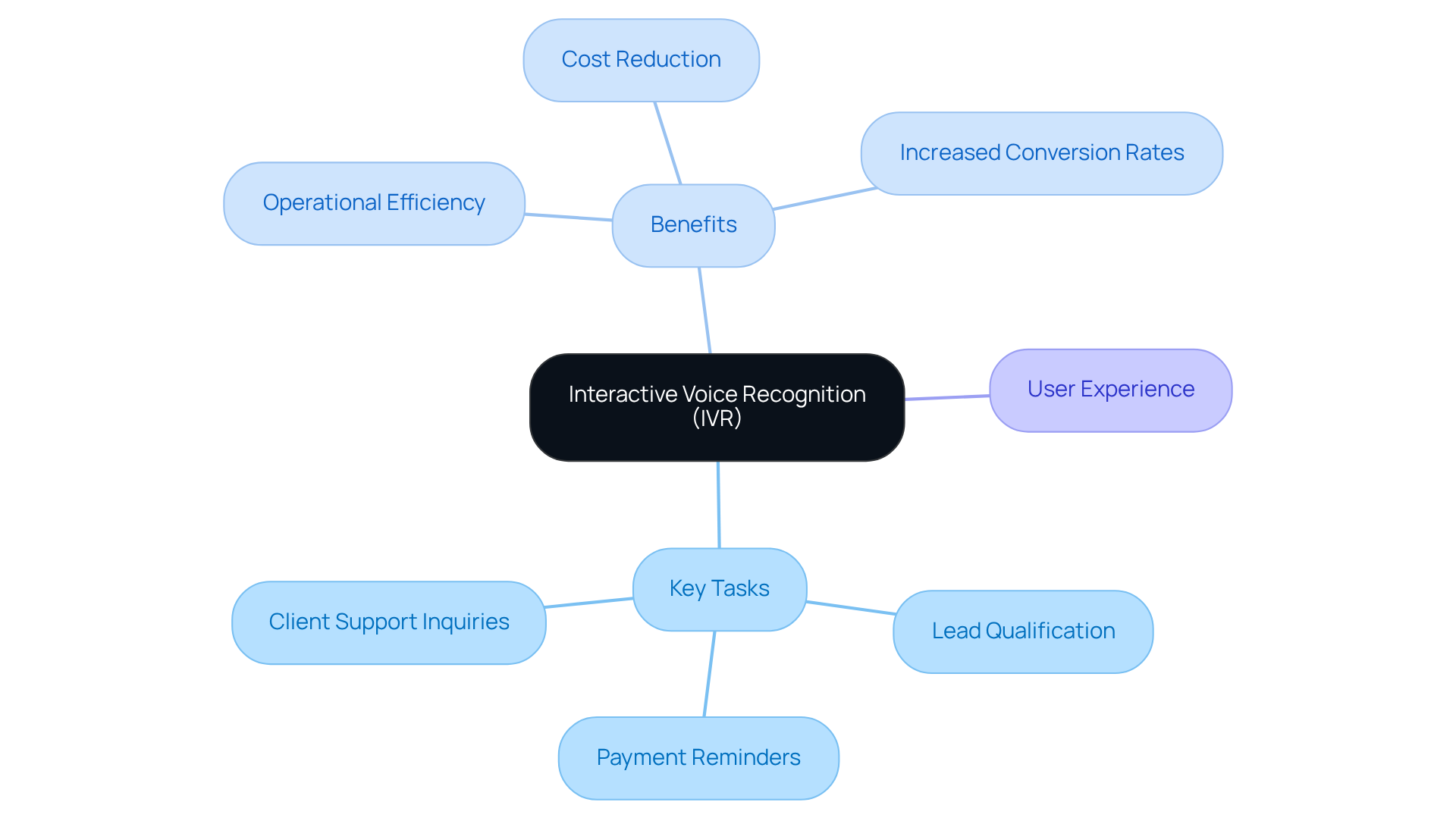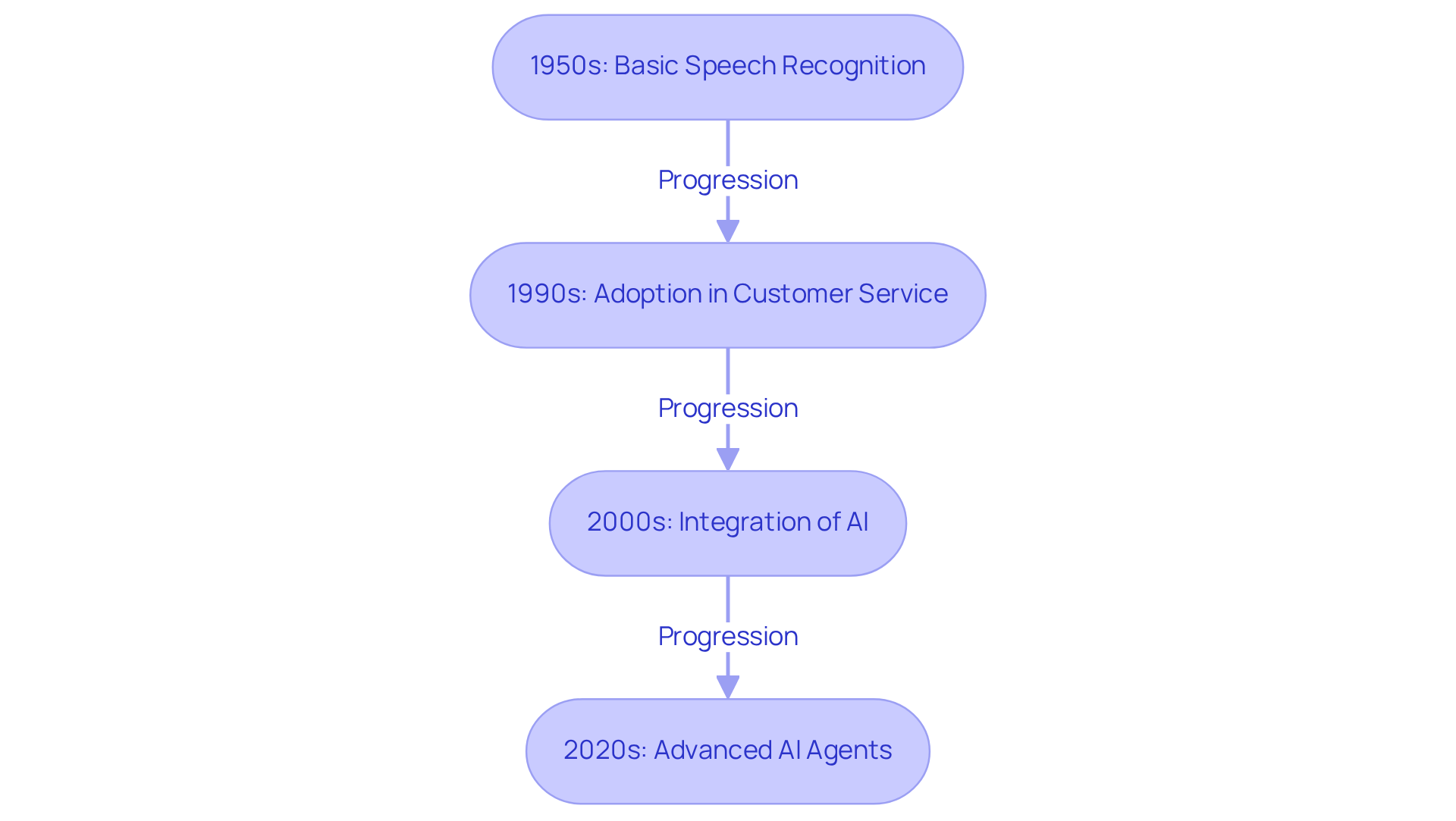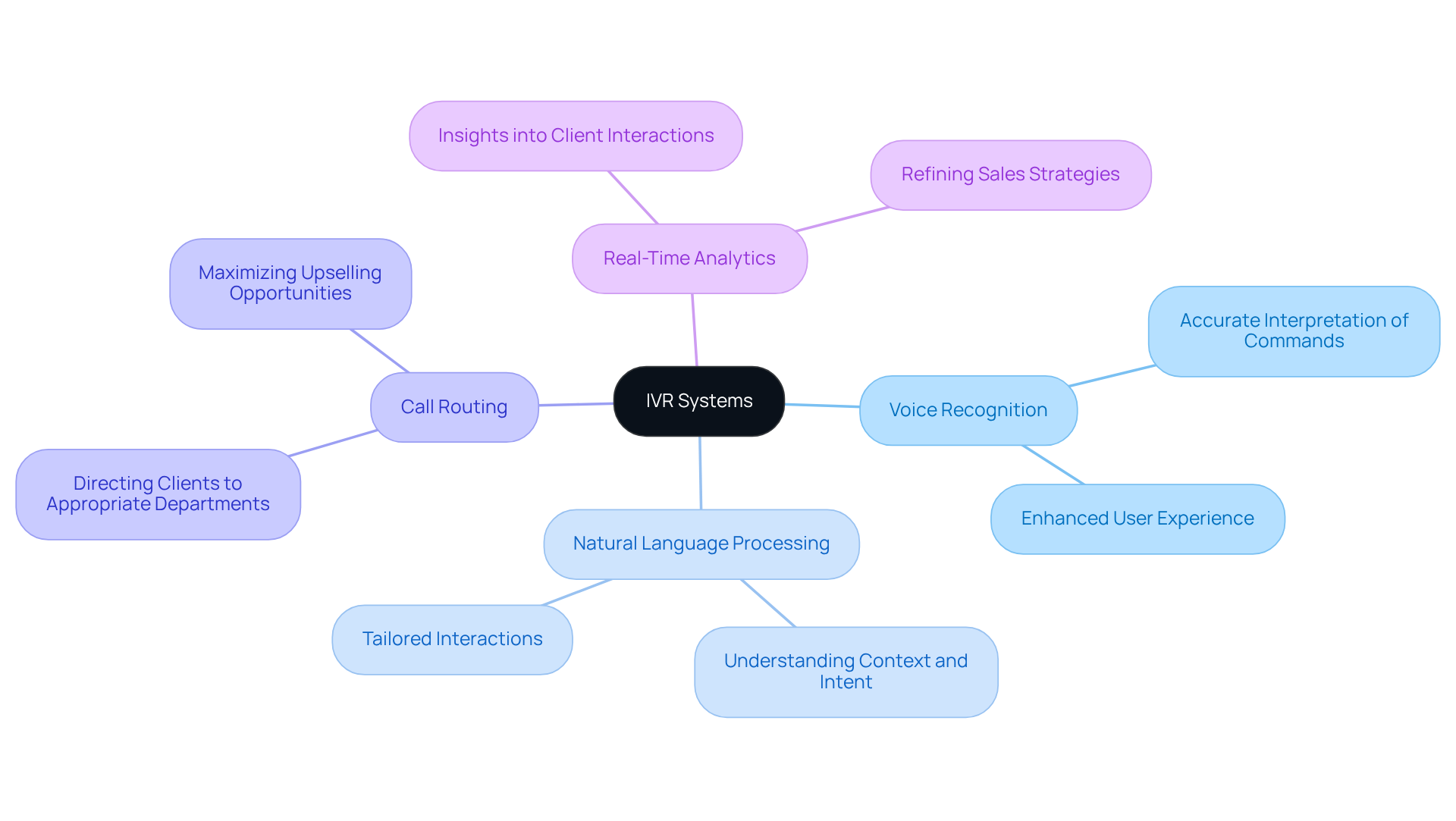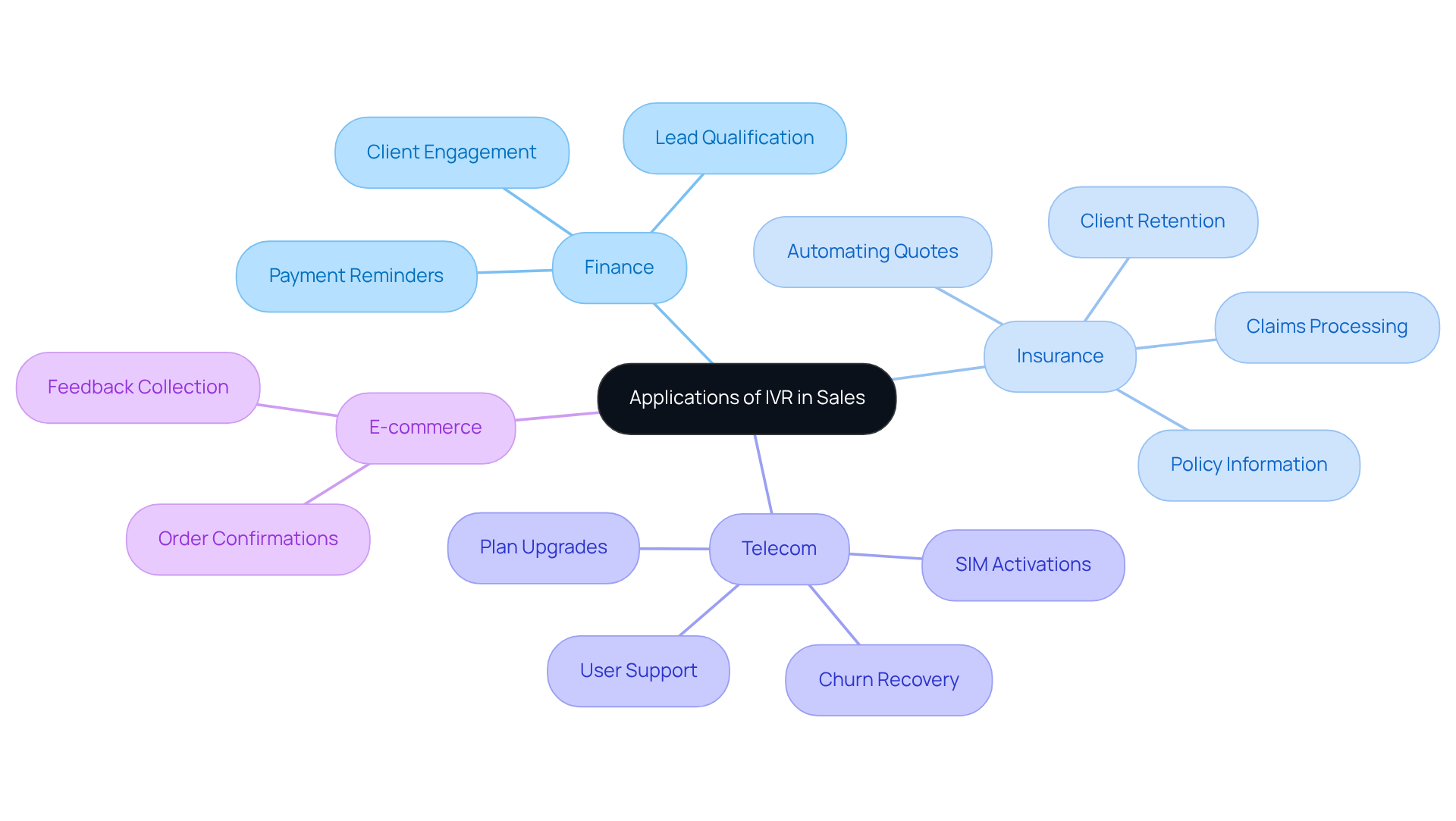Overview
Interactive Voice Recognition (IVR) stands as a pivotal technology, enabling users to engage with computer systems through voice commands. This innovation plays a crucial role in sales by automating client interactions and significantly enhancing user experience. IVR not only improves operational efficiency but also reduces costs and increases conversion rates. Its applications span various industries, including finance and e-commerce, where it streamlines processes and fosters personalized client engagement. By leveraging IVR, organizations can transform their customer interactions, ultimately driving better business outcomes.
Introduction
The rise of technology has fundamentally transformed the way businesses engage with their customers, positioning interactive voice recognition (IVR) at the forefront of this revolution. Seamless voice interactions enabled by IVR systems not only automate client communications but also significantly enhance operational efficiency and user satisfaction in sales processes.
As organizations increasingly adopt these advanced solutions, a pressing question emerges: how can businesses effectively leverage IVR to optimize their sales strategies and ensure they remain competitive in this rapidly evolving landscape?
Embracing IVR is not merely an option; it is a strategic imperative for those seeking to thrive in the modern marketplace.
Define Interactive Voice Recognition and Its Importance in Sales
What is interactive voice recognition, and how does it stand as a pivotal technology that empowers users to interact with computers through voice commands? In the realm of sales, IVR systems serve as a catalyst for businesses, automating client interactions, streamlining processes, and significantly enhancing user experience. IVR efficiently manages critical tasks such as:
This illustrates what is by adeptly identifying and processing spoken language. The importance of IVR in sales is underscored by its ability to boost operational efficiency, reduce costs, and elevate conversion rates, all while providing clients with timely responses and personalized interactions.

Trace the Evolution of Interactive Voice Recognition Technology
The development of Interactive Voice Recognition technology began in the 1950s, featuring basic speech recognition tools capable of understanding only a limited vocabulary. Over the decades, significant advancements in machine learning and natural language processing have markedly enhanced what is interactive voice recognition. By the 1990s, what is interactive voice recognition technologies gained traction in customer service, enabling businesses to effectively automate call routing and information retrieval.
Today, the integration of demonstrates what is interactive voice recognition by enabling the engagement in complex conversations, comprehension of context, and delivery of tailored responses. This evolution has rendered them invaluable tools in contemporary sales strategies. Notably, companies like GCS have successfully scaled their sales efficiency by leveraging Intone's customizable AI voice agents, which necessitate no setup or tuning. Businesses can seamlessly upload scripts and training materials, enabling these AI agents to be specifically tailored to their operational needs.
The IVR market is projected to expand to nearly $7 billion by 2026, underscoring the increasing adoption of automated solutions aimed at enhancing user experiences. Furthermore, user-friendly interfaces and self-service capabilities are critical for maximizing IVR utilization, as they empower clients to resolve issues efficiently. As industry specialists highlight, advancements in speech recognition technology have transformed IVR solutions into sophisticated tools, showcasing what is interactive voice recognition, that not only improve operational efficiency but also significantly enhance client engagement. This is exemplified by the smart analytics and real-time insights offered by AI agents.

Examine Key Features and Functionalities of IVR Systems
In modern customer engagement strategies, what is interactive voice recognition (IVR) solutions and how are they pivotal? Key features such as voice recognition, natural language processing, call routing, and real-time analytics are essential components that can be significantly enhanced by leveraging Intone's AI voice agents. empowers the system to accurately interpret spoken commands, while natural language processing enables it to understand context and intent, fostering tailored interactions that resonate with clients.
Furthermore, call routing is instrumental in directing clients to the appropriate department or agent based on their specific needs. This not only improves operational efficiency but also maximizes upselling opportunities, ensuring that businesses can capitalize on every interaction. Real-time analytics provide valuable insights into client interactions, allowing organizations to refine their sales strategies continuously.
By integrating telephony with AI voice agents from Intone, businesses can customize interactions, establish data sources, implement call transfer regulations, and enhance post-call reporting. Ultimately, these enhancements lead to improved client engagement and increased conversion rates, solidifying the role of IVR solutions as a cornerstone of effective customer communication, particularly when considering what is interactive voice recognition.

Explore Applications of IVR in Sales Across Industries
In various industries, including finance, insurance, telecom, and e-commerce, it is essential to understand what interactive voice recognition technology is and its applications.
In the finance sector, IVR systems automate payment reminders and lead qualification, significantly enhancing client engagement. The AI sales agents from the company facilitate easy deployment and customization, empowering financial institutions to tailor interactions to individual client needs.
Meanwhile, in insurance, IVR streamlines claims processing and provides policy information, with the company further boosting efficiency by automating quotes, renewals, and client retention efforts.
Telecom firms leverage IVR for support, allowing users to resolve issues without waiting for an agent. The voice automation features manage high call volumes for SIM activations, plan upgrades, and churn recovery campaigns, enhancing service delivery.
E-commerce businesses utilize IVR for order confirmations and feedback collection, improving the overall customer experience.
These diverse applications underscore interactive voice recognition technology's adaptability in across various sectors, particularly when integrated with Intone's advanced AI solutions.

Conclusion
Interactive Voice Recognition (IVR) technology plays a crucial role in transforming sales processes across various industries. By facilitating voice-activated interactions, IVR systems not only enhance operational efficiency but also significantly improve customer engagement. The integration of AI-driven voice agents further amplifies these benefits, allowing businesses to tailor their communications and streamline client interactions effectively.
Throughout this article, key insights into the evolution of IVR technology have been highlighted, showcasing its journey from basic speech recognition systems to sophisticated AI-powered solutions. The discussion covered various functionalities, such as voice recognition, natural language processing, and real-time analytics, all of which contribute to a more personalized customer experience. Moreover, the diverse applications of IVR in sectors like finance, insurance, telecom, and e-commerce underscore its versatility in optimizing sales strategies.
The significance of embracing Interactive Voice Recognition technology cannot be overstated. As businesses increasingly seek to enhance customer experiences and improve conversion rates, leveraging IVR systems presents a compelling opportunity. By adopting these advanced solutions, organizations can not only meet the evolving expectations of their clients but also position themselves for sustained growth and success in a competitive landscape. Embracing IVR technology is more than just a trend; it is a strategic move that can redefine how businesses engage with their customers.
Frequently Asked Questions
What is interactive voice recognition (IVR)?
Interactive voice recognition (IVR) is a technology that allows users to interact with computers through voice commands, enabling them to perform tasks and access information using spoken language.
How does IVR benefit businesses in sales?
IVR systems benefit businesses in sales by automating client interactions, streamlining processes, and enhancing user experience. They manage critical tasks such as lead qualification, payment reminders, and client support inquiries.
What are some specific tasks that IVR can manage?
IVR can manage tasks such as lead qualification, payment reminders, and client support inquiries.
Why is IVR important in sales?
IVR is important in sales because it boosts operational efficiency, reduces costs, and elevates conversion rates, while also providing clients with timely responses and personalized interactions.






